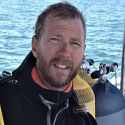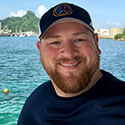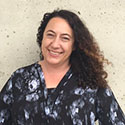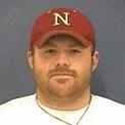Deepwater Surveys of World War II U.S. Cultural Assets in the Saipan Channel
February 24 - March 11, 2022
Exploration Team

Eric Terrill
Director, Marine Physical Laboratory, Scripps Institution of Oceanography, University of California San Diego
Eric Terrill is an oceanographer with 25 years of experience leading basic and applied research programs around the globe. In 2003, he established a research and development center to rapidly field new technologies and conduct exploratory and expeditionary research within the Marine Physical Laboratory at Scripps Institution of Oceanography, one of four original Navy-University Applied Research Laboratories established in World War II. Dr. Terrill has extensive experience working with industry to develop, improve, and evaluate new ocean technologies and unmanned platforms. He has a B.S. in Applied Mechanics and Engineering sciences from the University of California, San Diego and a Ph.D. in Physical Oceanography-Applied Ocean Sciences from Scripps Institution of Oceanography. He is the co-founder of Project Recover, a private-public collaborative which conducts global searches using unmanned underwater vehicles and pre-mission historical analysis to locate World War II-era aircraft crash sites for reporting to the Defense POW/MIA Accounting Agency. He is an avid diver with over 30 years of diving experience.

Andrew Pietruszka
Underwater Archaeologist, Scripps Institution of Oceanography
Andrew Pietruszka is an underwater archaeologist specializing in the search, documentation, and recovery of U.S. service members missing in action as a result of our nation’s past conflicts. He received an M.A. in Underwater Archaeology/Maritime Studies from East Carolina University and a Ph.D. in Anthropology from Syracuse University. He has over 15 years of experience conducting underwater archaeological research around the world. In March 2011, Dr. Pietruszka joined the Defense POW/MIA Accounting Agency (DPAA) as a forensic archaeologist overseeing underwater recovery operations. In 2015, he served as the interim director of DPAA’s laboratory at Offutt Air Force Base in Omaha, Nebraska. While at DPAA, Dr. Pietruszka successfully completed four months of training at the U.S. Navy’s Special Operations Dive School in both SCUBA and surface supplied diving. In 2016, took an academic research position at the University of Delaware where he served as the forensic/archaeological expert for Project Recover—a collaborative effort to enlist 21st-century science and technology to find the final underwater resting places of Americans missing in action since World War II. Currently, Dr. Pietruszka is an underwater archaeologist at the Scripps Institution of Oceanography – University of California San Diego and serves as the lead archaeologist for Project Recover.

Mark Moline
Director, School of Marine Science and Policy, College of Earth, Ocean, and Environment, University of Delaware
Mark Moline serves as the Director of the School of Marine Science and Policy at the University of Delaware. Dr. Moline received his B.A. from St. Olaf College and Ph.D. from the University of California, Santa Barbara. Dr. Moline was an early adopter of uncrewed underwater vehicles for research, with more than 20 years of experience and over 900 deployments/recoveries around the globe. Dr. Moline has authored over 150 peer-reviewed articles on topics including biology, optics, imagery, modeling, underwater robotics, and autonomy. He has received a number of prestigious awards including the Presidential Early Career Award for Scientists and Engineers, the Office of Naval Research Young Investigator Award, and NASA New Investigator Program award, and he served as the Distinguished Arctic Fulbright Chair. He is the co-founder of Project Recover—a collaborative effort to enlist 21st-century science and technology to find the final underwater resting places of Americans missing in action since World War II.

Colin M. Colbourn
Lead Historian, Project Recover, University of Delaware
Colin Colbourn is a historian of war and society specializing in the historical process that attends the search, recovery, and repatriation of Americans missing in action as a result of our nation’s past conflicts. Dr. Colbourn received his M.A. in War and Society and completed his Ph.D. at the University of Southern Mississippi. In May 2013, he joined the Defense POW/MIA Accounting Command (DPAA) at Offutt AFB, Nebraska, as a Historian and ORISE Fellow. At DPAA, Dr. Colbourn was part of a historical research team that worked alongside forensic anthropologists and odontologists to identify missing personnel from World War II. In 2015, Colin served as a historian and associate editor with Rowan Technology, a publishing partner of the U.S. Military Academy at West Point. At Rowan, he helped build and manage West Point’s fully digital and interactive publication, The West Point History of Warfare. As lead historian for Project Recover, Dr. Colbourn coordinates historical operations including archival research, data management, case analysis, and field investigations. Through these efforts, Project Recover has developed a massive internal archive that includes thousands of historical reports, maps, and images. In the field, Dr. Colbourn liaises with local partner organizations on cases and conducts oral histories with locals who may have witnessed a fallen soldier’s final moments.

Heidi Batchelor
GIS Analyst, Scripps Institution of Oceanography
Heidi Batchelor earned an M.A. in Geography from San Diego State University, specializing in geographic information systems (GIS) and remote sensing of the marine environment. When not traveling for scuba diving, she teaches classes in GIS at the Scripps Institution of Oceanography and online. She is an experienced data analyst having worked with a wide variety of oceanographic data including sidescan sonar, sub-bottom profilers, vessel and autonomous underwater vehicle-based multibeam, and acoustic arrays. At Scripps, she manages data repositories and databases for marine data and maintains web content.

Robert Hess
Engineer, Scripps Institution of Oceanography
Robert (Bob) Hess attended Dickinson College and Southern New Hampshire University where he earned degrees in electrical engineering and robotics and artificial intelligence. Bob is a seasoned underwater robotics engineer, and his career includes time at the Woods Hole Oceanographic Institution, Rutgers, Hydroid, and Scripps Institution of Oceanography. A former college football player and college baseball player, Bob remains an avid sports fan and is a little league coach.

Andrew Nager
Engineer, Scripps Institution of Oceanography
Andrew (Andy) Nager received his degrees in geophysics and engineering from Brown University. He was a member of the Peace Corps in Paraguay where he taught high school and led a project designing brick ovens for the local community. As part of the Engineering team, Andy works on all aspects of autonomous underwater vehicles, from design modifications, component installation and maintenance, and field operations. He has experience working with sidescan sonar, multibeam sonar, and scientific diving and has spent extensive time in the field.